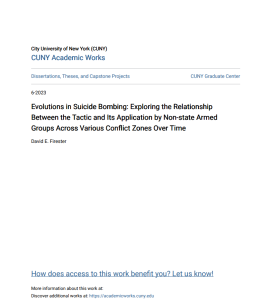The following dissertation considers variations in the use of suicide bombing by Non-State Armed Groups (NSAGs), at the organizational level of analysis. It is both a quantitative and qualitative assessment of the conditions under which insurgents that accept the practice’s legitimacy have applied it to a range of specified target sets. The broad focus of this endeavor centers on unpacking insurgent groups’ behaviors across a number of unique battlespaces, but the main question I seek to answer is: what decision dynamics accompany violent non-state actors’ use of suicide bombing and how do we interpret their behavioral interaction across various conflict zones, so as to better illuminate why they continue to attack in this way? Put differently, what does suicide bombing, as an operational-level tactic as opposed to a presumably fully developed strategy, reveal about NSAGs who use it? I also explore a more narrowly tailored sub-set of questions that aim to uncover why insurgents that do use it, do so in different ways, which also entails an analysis of non-suicide bombing attacks against the same range of target sets. To that end, I explore the ways suicide bombing is used by several organizations, within a variety of combat venues, as a means for better understanding its uses; namely, adapting to and shaping, unique battlespaces. I find that organizations such as al-Qa’ida (AQ) are more sensitive to branding/re-branding dynamics associated with the targeting of civilians, while others such as Islamic State (IS) incorporate suicide bombing as a key component of their war arsenal against civilian, security, and competitor target sets. This may explain why it generally tended to be the case in multiple venues that AQ didn’t practice suicide bombing against IS, but IS did so against AQ. The exploratory nature of my work can be seen in the methodological approach I take, which extracts data points and re-forms them as variables that can be scrutinized further. This has implications for policy, theory, and epistemology. In policy terms, I elucidate the need to consider suicide bombing as an instrumental means for achieving objectives that are positioned below the threshold of a fully developed strategy. Theoretically, in contrast to a leading explanation for the practice, I am able to say with some confidence that the presence of foreign militaries has had little to no impact on the use of suicide bombing. Epistemologically, disaggregating target types, based on the dataset’s existing narratives, is a viable path for better understanding how suicide bombing violence is used by non-state actors. Evolutions in Suicide Bombing: Exploring the Relationship between the Tactic and Its Application by Non-State Armed Groups Across Various Conflict Zones Over Time

